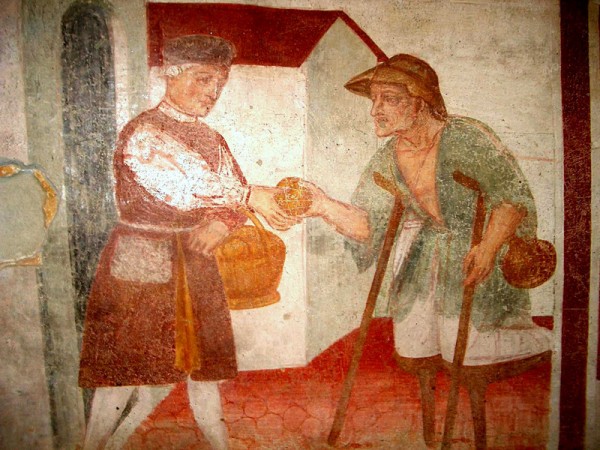 Jesus told a story about a fellow who made himself rich twice.
Jesus told a story about a fellow who made himself rich twice.
He was the bookkeeper for a rich man, a landowner. and the first fortune came from cheating the landowners’ tenants by adding false charges to their bills. He made the landowner really wealthy by doing this, and made himself an indispensable employee.
But then the economy changed. The landowner was losing money fast. And the bookkeeper was really scared about his own future. So he switched his loyalty. He began taking more off people’s bills than they had actually paid, wiping out their debts faster than they had ever imagined.
And the bookkeeper thought to himself, when the economy crashes, I’ll be out of work; and I’m too old to do manual labor; but some of these little folks I’ve helped will look on me kindly, and make sure I don’t starve.
This story is commonly known as the tale of the dishonest steward. But Jesus doesn’t call him dishonest. Nor does he call him honest. He calls him wise.
Most folks, in talking about this story, never think about the wisdom in it, because they can’t get over the dishonesty. The fellow belongs in jail, folks say, and they dismiss the story in disgust.
The fall elections are all about this story. One candidate, a business man, has made a fortune from many business ventures that he started, and when they failed he went to bankruptcy court for protection. There is even a University that made a boodle of bucks and never issued a degree. All of this is legal, says the candidate. And he is right about the law. But that was no consolation to the small business folks who did business with his failed businesses, and never got paid for their work, because bankruptcy court protects the wealthy from their debts.
Another candidate may have traded her influence in the world of power for big bucks donated to projects for the poor. Or she may not have. It may just look as if that were possible. Maybe nothing happened. In any case, as the candidate says, nothing she did was illegal. And she is right about that.
In Jesus’ eyes, making friends with the poor by means of ‘unrighteous mammon’ is wise, because in the realm of God’s holiness, the poor are beloved far more than the rich. And so we store up treasure in heaven when we help the poor.
Jesus doesn’t stipulate a narrow path for righteous help. Nor does he forbid righteousness to sinners.
Zaccheus, a tax collector whose profession was known for its stealing from the poor, was declared by Jesus to be a virtuous fellow when he avowed that he gave 40% of all he got to the poor.
The widow, who could have used her little bit of money to treat herself to a holiday meal, but instead put her coins, all she had, into the poor box, was held up by Jesus as a shining example of generosity.
And the bookkeeper who couldn’t do manual labor, and so helped the poor as insurance against hard times, Jesus declared wise.
Crying Foul! is commonplace among us, especially at election season. But Jesus reminds us that what is Fair, according to God, is siding with those who owe and groan under the weight of their debt, not with those whose ledgers are pristine, and who have never shown mercy to a debtor.
In the Lord’s Prayer, Jesus instructs us, when we pray, to remember to ask for forgiveness for our debts, a forgiveness for which we hold up our own forgiving of the debts of others.
In one translation, the word is trespasses. In another gospel, it is debts. Both have the same connotation, of rules bent or even broken, in mercy and in need, and of the wisdom of the steward, whose need will be met with mercy because he learned to be merciful when he had the chance to be.
Take these risks, says Jesus, who bends Sabbath rules, sex rules, and money rules, all in the name of mercy.
___________________________________________________
Image: Feed the Hungry Mural, Chiesa del San Marco, Paruzzaro, Italy, 15th-16th century. Vanderbilt Divinity School Library, Art in the Christian Tradition.










